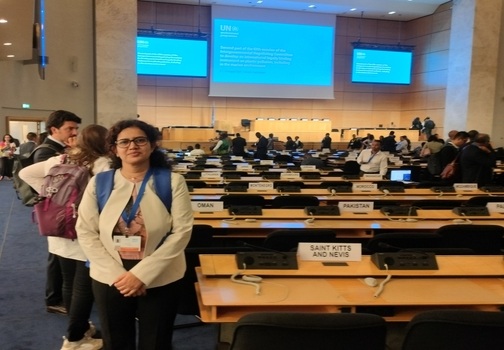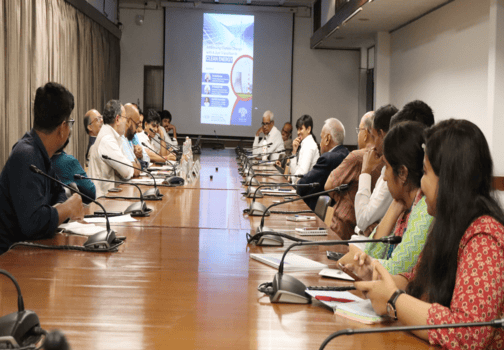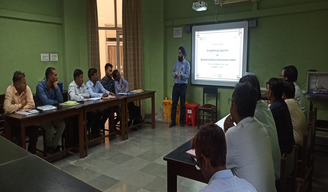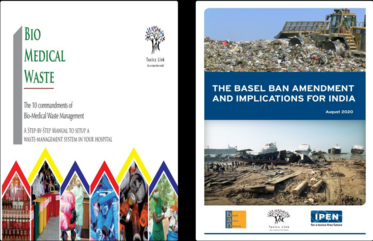Solid Waste Disposal System
GOVERNMENT OF INDIA
MINISTRY OF ENVIRONMENT, FOREST AND CLIMATE CHANGE
LOK SABHA
UNSTARRED QUESTION No. 734
TO BE ANSWERED ON 07.02.2022
Solid Waste Disposal System
734. DR. AMAR SINGH:
Will the Minister of ENVIRONMENT, FOREST AND CLIMATE CHANGE be pleased to state:
(a) the details of solid waste disposal system in the city of Delhi in light of the increasing air pollution in the winter months, district-wise;
(b) whether the Ministry is looking at introducing any new innovations to tackle the same
considering municipal solid waste accounts for the majority of air pollution in the
neighbouring States of Delhi, if so, the details thereof;
(c) the details of any comprehensive studies undertaken in the last three years to ascertain
the sources of such waste and its disposal, State/UT-wise; and
(d) whether the Ministry has introduced any programmes focused on effectively tackling solid waste?
ANSWER
MINISTER OF STATE IN THE MINISTRY OF ENVIRONMENT, FOREST AND CLIMATE CHANGE
(SHRI ASHWINI KUMAR CHOUBEY)
(a) The details of solid waste disposal system in the city of Delhi, Urban Local Bodies
(ULBs)-wise are as under:
ULBs of Delhi MSW Generated (in
TPD)
Waste Processing (in TPD)
South Delh Municipal Corporation 3,500 2,000
New Delhi Municipal Council
(NDMC)
273 273
Delhi Cantonment Board 72 42
East Delhi Municipal Corporation 2,600 1,300
North Delhi Municipal Corporation 4,500 2,300
Total 10,945 5,915
(b) The Ministry of New and Renewable Energy under Waste to energy Programme has
recognized incineration/gasification/pyrolysis as waste to energy conversion technologies for
treatment of municipal solid waste and biomethanation process for wet waste
(c )Annual Reports on status of implementation of SWM Rules,2016 in States/UTs have been
prepared, which are available on CPCB website https://cpcb.nic.in/status-of-implementationof-solid-waste-rules/ .
(d) As per Solid Waste Management Rules, 2016, local bodies and village panchayats shall
facilitate construction, operation and maintenance of solid waste processing facilities and
associated infrastructure on their own or with private sector participation or through any
agency for optimum utilization of various components of solid waste adopting suitable
technology including the following technologies and adhering to the guidelines issued by the
Ministry of Housing and Urban Affairs from time to time and standards prescribed by the
Central Pollution Control Board. Preference shall be given to decentralized processing to
minimize transportation cost and environmental impacts such as:
- bio-methanation, microbial composting, vermi-composting, anaerobic digestion or
any other appropriate processing for bio-stabilisation of biodegradable wastes;
- waste to energy processes including refused derived fuel for combustible fraction of
waste or supply as feedstock to solid waste based power plants or cement kilns
The Rules stipulate specific criteria to encourage the use of solid waste in the waste to energy
plants. It has been mentioned that (i) non recyclable waste having calorific value of 1500
K/cal/kg or more shall not be disposed of on landfills and shall only be utilised for generating
energy, (ii) High calorific wastes shall be used for co-processing in cement or thermal power plants.
The plastic waste invariably forms the part of solid waste. Therefore, for the plastic waste, the
key technologies prescribed are (i) utilization of plastic waste in road construction, (ii) Coprocessing of plastic waste in Cement Kilns, (iii) Conversion of plastic waste into liquid RDF
(Oil) and (iv) Disposal of plastic waste through Plasma Pyrolysis Technology (PPT).






